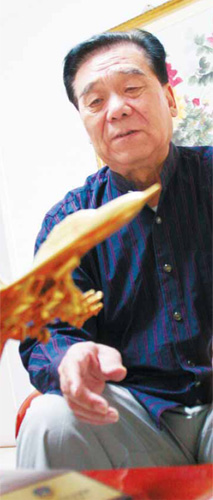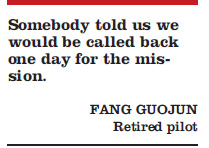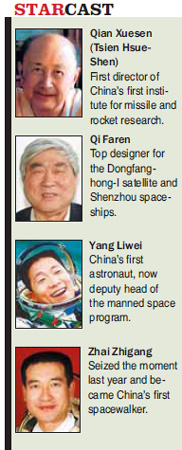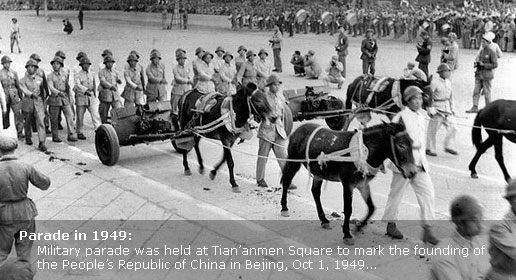60 People, 60 Stories
Stellar pioneer
By Li Xiaokun and Peng Kuang (China Daily)
Updated: 2009-09-30 07:41
In the autumn of 1969, Fang Guojun was a 33-year-old air force officer training pilots in Zhanjiang, Guangdong province.
|
 Fang Guojun, who was very close to becoming China's first astronaut in 1971, kept the secret of his possible selection to himself and the dream alive for 30 years after the manned space program was aborted.
[China Daily/Peng Kuang] |
One day, his superiors suddenly told him to pack up and head for Beijing. Nobody told him why he was going.
In the next few months, Fang underwent strict physical examinations in a military hotel. He was one of the 1,919 pilots from the air force who met a "preliminary standard". Of these, only 19, including Fang, were selected for the last phase.
Fang finally realized he was among the first batch of astronauts China was secretly training as part of the national space program. Fang was the
No 1 candidate among the group.
"The conditions then were very poor, but we had good teachers," says Fang, singling out Qian Xuesen, the father of the Chinese missile.
"Our preparations were heading in the right direction."
But in late 1971, his group was hit with bad news.
Lin Biao, then China's No 2 leader with the air force under his wings, fled after a failed coup on Sept 13, 1971. The plane he took crashed in Mongolia, killing everyone on board, including his son Lin Liguo.
"Our airship 'Shuguang' was completed. I had tried on my space shuttle uniforms. But Chairman Mao Zedong ordered us to halt our program. He wanted to deal with 'things on Earth' first," Fang says.
"The pause lasted for decades."
When the group was dismissed later, Mao demanded that its members not release a single word of the secret program, not even to their family.
"We were very sad, but we also knew we had to accept and deal with the overall situation of the country," Fang says.

But Fang's dream of space was always alive. He even maintained his 78-kg weight in the following three decades.
"Somebody told us we would be called back one day for the mission," he says.
That dream arrived in 2000, when he read in the newspapers that China's first batch of astronauts were on their way into space. Later, news of Fang's mission decades ago also broke. The military told Fang he was no longer required to keep the secret.

"I realized then I was old. Exploring the heavens should be left to younger people," Fang says.
China sent its first astronaut Yang Liwei into space in 2003 on the self-developed spacecraft Shenzhou V. His mission was followed by a two-man trip that carried Fei Junlong and Nie Haisheng in 2005.
Last year, Shenzhou VII taikonauts Zhai Zhigang, Liu Boming and Jing Haipeng orbited Earth for three days.
Zhai became the first Chinese to "set foot" in outer space on Sept 27, 2008. His spacewalk lasted about 20 minutes and paved the way for the country's next space mission - the launch of a space station in 10 years.
Fang later wrote a letter to Yang Liwei to congratulate him.
"I called him an unprecedented hero of the Chinese people," Fang says.
Yang quickly wrote a reply to Fang.
His letter went: "We'll never forget you."
Time line
1956
China's first rocket research institution is founded. 1964
The first biological rocket is launched, carrying white mice into space.
1968
The Institute of Space Medico-Engineering is established, initiating the selection and training of astronauts and the manned space flight medical engineering research.
1969-1971
China picks 19 astronauts from its air force for the Shuguang-I project, the country's first manned space mission.
1970
China launches its first artificial Earth satellite, the Dongfanghong-I satellite.
1971
The Shuguang-I project is called off due to budget constraints and the Lin Biao incident. The air force, until then ruled by the Lin Biao clique, is reshuffled following Lin's death after a failed coup d'etat.
1992
The manned space program is revived.
1998
China picks 14 astronauts.
1999-2002
China launches four unmanned spaceships, laying solid foundations for future manned spacecraft.
2003
The launch of China's first manned aircraft sends astronaut Yang Liwei into space.
2005
The Shenzhou VI manned aircraft sends two astronauts into space.
2008
Zhai Zhigang conducts China's first spacewalk as part of the Shenzhou VII space mission.
2009
45 aviators, 15 of them female, are short-listed for training as China's next batch of astronauts. China announces plans for manned space station in 10 years.







